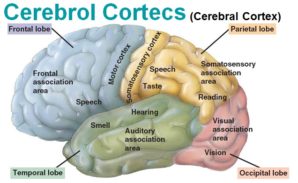
The name Cortecs represents everything that the company is about. The full company name is Cortecs Cerebrol which is Cerebral Cortex in Welsh. The cerebral cortex is the wrinkly part of the brain that is often referred to as ‘grey matter’. Essentially, it is where our high level brain functions occur including intelligence, language, memory and consciousness. This is then, the part of our brains that developed the programmes, where the skills and knowledge that we are sharing reside and where the process of learning these skills will take place. We decided on the Welsh spelling to reflect the Welsh brains that came up with the concept, ethos and ultimately the Cortecs’ learning experience.
I have always believed whole heartedly in the value of learning and have throughout my career sought to develop my skills. For example as an adult learner I have completed a range of qualifications which include a BSc 1st class Honours degree in Occupational Psychology and an MSc in Occupational Psychology. I am also a qualified Psychometrician which enables me to administer and interpret psychometric assessments. This knowledge along with my business experience informs not just the programmes Cortecs deliver but the way we work as a company and means that every aspect of Cortecs is underpinned by solid science, experience and values.
It was really important that the company name, reflected the fact that Cortecs programmes are designed by applying robust psychological research, both in terms of the content of learning being specific to the current leadership and management expertise needed but, as importantly, with an understanding of how people learn. For example, there is a difference between knowing something and actually applying that knowledge, I know how to exercise and eat healthily but what I actually do at lunchtime is get in the car and drive across the road to Greggs! Leadership and Management skills are no different. You can know what you should or could do, but that doesn’t mean that this knowledge will actually be applied to how you lead and manage your team or indeed yourself. In order for any training to translate to actual behaviour a range of things need to happen. The individual needs to learn the skills, know how and when to apply them and be sufficiently motivated to apply these skills in their workplace and make the skills part of their behavioural lexicon. This is where standard training fails, as a range of research has shown that sitting passively in a training room or staring at a screen, listening to someone tell you how do to something is not the ideal way to learn. In contrast to the ‘standard’ approach our courses challenge, promote reflection and are hugely enjoyable.
